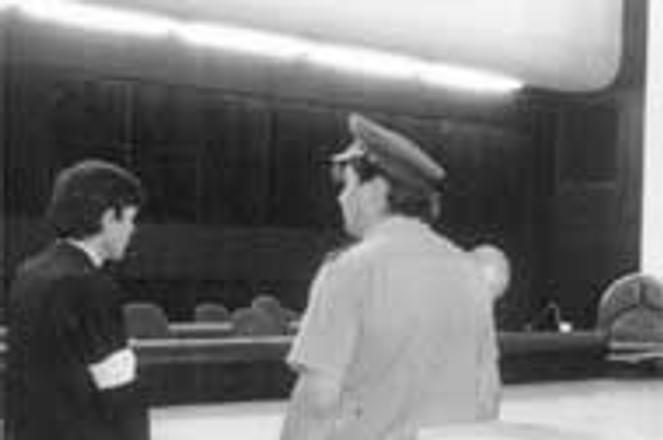Free at last. Slovak judges have been given more room to shape the judiciary by Justice Minister Ján Čarnogurský.photo: TASR
Justice Minister Ján Čarnogurský is under heavy fire from all quarters these days. After refusing to support his own cabinet's programme on November 23, he was accused by his coalition mates of trying to destablise the government and destroy the ruling SDK party. And after threatening to recall General Prosecutor Michal Vaľo, he was pilloried by the opposition HZDS party for conducting a personal vendetta.
But there exists a strong current of professional support among the nation's judges for Čarnogurský's work as Justice Minister. Čarnogurský has sent positive democratic signals by letting judges elect their own leaders, judicial experts say, and deserves credit for improving the independence of the judiciary.
One of the minister's first steps in office was to recall the chief justices and deputy chief justices of the country's 38 regional and 8 district courts on December 11. Under the former administration of Premier Vladimír Mečiar, these positions had been filled by cabinet appointees, but Čarnogurský issued an order that a secret ballot be held for these posts among the judges themselves between December 14 and 18.
Pavel Rohárik, chairman of the independent Association of Slovak Judges (ZSS), said that Čarnogurský's initiative was the first time a Slovak Justice Minister had listened to the opinions of the country's judges since the association was formed in 1991. "It's a very positive step and a highly democratic signal," said Rohárik. "It avoids suspicion of any personal, local or other influences."
Rohárik said that in the past, judges had had no say in selecting top judicial representatives. "The former government named the state administrators of the courts - the chief and deputy chief justices - in discrepancy with the law on judges and courts, and in most cases did not respect the opinions of the judicial councils," he told the independent SITA press agency.
Fair vote
In the wake of the December secret ballot, the minister declared himself satisfied with the candidates elected. "I decided to respect the ZSS proposals for the new chief justices and deputy chief justices," said Čarnogurský, adding that by January 20 the new chief justices would be named. "A similar process will follow with the deputy chief justices," he said.
But Juraj Majchrák, vice-chairman of the Council of Slovak Judges, the highest state judicial advisory body, said that he was not content to rely on the good will of the Justice Minister. A law was needed, he argued, to secure both the right of judges to elect their own leaders as well as the integrity of the judicial system.
"Having the Justice Minister name chief justices is very unusual in democratic countries," said Majchrák. "To keep judges independent [from the state], there should be a different body which would nominate judges to the heads of courts," he said.
Čarnogurský agreed, saying that he was preparing legislation to enshrine this practice. "So far they have only my word as a gentleman," he said, "but we'll draw on our experiences from the current method of naming chief justices to prepare a law for approval some time next year [2000]."
For now, then, the minister and the nation's judges have agreed to cooperate and keep faith with each other on issues such as the system of naming chief justices, the educational and promotional tasks of the judiciary and the self-administration of judicial organizations.
"We [the ZSS] made a bold agreement with the minister [Čarnogurský] that we would not push him to have the law approved in 1999, but that we would instead cooperate with the ministry on finding the most suitable draft law," explained Majchrák.
Giving judges the power to elect their chiefs is only one part of Čarnogurský's overall judicial vision, however. In order to improve the overall independence of Slovak judges, the minister vowed to eliminate a provision in the constitution which stipulates that all judges in Slovakia be named by parliament first to a four-year trial period in the courts, and then re-named for life. "Judges in the four-year period cannot always behave independently if they know that their re-naming is a political decision," Rohárik said.
Despite the democratic appearance of the Justice Minister's initiatives, however, Čarnogurský is determined to retain a measure of state control over the judiciary. "The Justice Ministry is responsible for the administration of the courts, and if we don't want to give up this responsibility, we cannot transfer any executive powers to independent organs," said Čarnogurský.
Majchrák said he understood Čarnogurský's reluctance to make the judiciary fully free, for all that he disagreed with it. "Each government will naturally try to interfere with the powers of the judiciary," he said. "It's logical because the courts often deal with political cases, and the cabinet and the parliament would obviously like to influence the outcomes."


